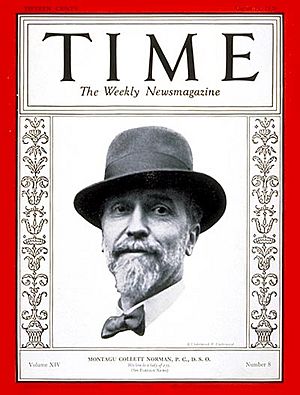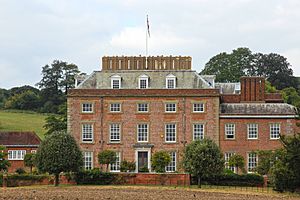Montagu Norman, 1st Baron Norman facts for kids
Quick facts for kids
The Lord Norman
DSO PC
|
|
|---|---|

Norman on the cover of Time, 1929
|
|
| Governor of the Bank of England | |
| In office 1920–1944 |
|
| Preceded by | Sir Brien Cokayne |
| Succeeded by | The Lord Catto |
| Member of the House of Lords Lord Temporal |
|
| In office 1944 – 4 February 1950 Hereditary Peerage |
|
| Preceded by | Peerage created |
| Succeeded by | None |
| Personal details | |
| Born |
Montagu Collet Norman
6 September 1871 Kensington, London, England |
| Died | 4 February 1950 (aged 78) Campden Hill, London, England |
| Spouse |
Priscilla Reyntiens
(m. 1933) |
| Profession | Banker |
Montagu Collet Norman (born September 6, 1871 – died February 4, 1950) was an important English banker. He is most famous for being the Governor of the Bank of England for a very long time, from 1920 to 1944. This was a challenging period for the world's economy.
Norman was known for his unique style and strong influence. Some people even called him "the currency dictator of Europe" because of how much power he had over money matters. A famous economist named John Maynard Keynes once said that Norman was "always absolutely charming, always absolutely wrong."
Contents
Early Life and Education
Montagu Norman was born into a family well-known in the banking world. His father, Frederick Norman, and his grandfather, Sir Mark Wilks Collet, were both important bankers. His grandfather had also been a Governor of the Bank of England.
Montagu went to a famous school called Eton. He then spent a year studying at King's College, Cambridge.
Military Service
In 1894, Montagu joined the 4th Bedfordshire and Hertfordshire militia. He later served in the Second Boer War in South Africa. For his bravery during the war, he received a special award called the Distinguished Service Order in 1901.
Banking Career
After his military service, Montagu Norman began his career in banking. He worked at several different banks, including Martins Bank and Brown, Shipley & Co., where his family members were partners. He became a partner at Brown Shipley in 1900.
Leading the Bank of England
In 1907, Norman became a director at the Bank of England. During World War I, he gave financial advice to the government. He became the Deputy Governor in 1917 and then the Governor in 1920. He held this important position for 24 years, guiding the bank through difficult times like the Great Depression.
Under Norman's leadership, the Bank of England changed a lot. He strongly supported returning to the gold standard in 1925. This meant that the value of money was directly linked to the amount of gold a country had. However, this decision was not supported by everyone, including economist John Maynard Keynes.
In 1931, during the worst of the Great Depression, Norman worried about the world's financial system. He tried to protect the British pound by borrowing a large sum of money. However, later that year, the United Kingdom had to stop using the gold standard.
Controversial Decisions
Montagu Norman was friends with Hjalmar Schacht, who was the head of Germany's central bank during the time of Adolf Hitler. Both Norman and Schacht were part of groups that promoted good relations between Britain and Germany.
In 1939, before World War II started, the Bank of England, under Norman's leadership, was involved in transferring gold that belonged to Czechoslovakia to Germany. This was a very controversial decision. Later in 1939, after the war began, Norman again supported transferring more Czech gold to Germany, but the British government stopped this from happening.
Norman retired from the Bank of England in 1944.
Later Life and Honours
After he retired, Montagu Norman was given the title of Baron Norman in 1944. This meant he became a member of the House of Lords. Besides the Distinguished Service Order, he also received other honours, including being made a member of the Privy Council of the United Kingdom and a Grand Officer of the Order of the Crown (Belgium).
Personal Life
In 1933, Montagu Norman married Priscilla Cecilia Maria Reyntiens. She was a London councillor and had two sons from a previous marriage, Sir Simon Towneley and Sir Peregrine Worsthorne. Montagu and Priscilla did not have any children together.
Norman lived in a house called Thorpe Lodge in London, which he had modernized in the Arts and Crafts style. He also lived at the Manor of St Clere in Kent.
Montagu Norman passed away in 1950 at his London home after having a stroke.
Images for kids
 | Emma Amos |
 | Edward Mitchell Bannister |
 | Larry D. Alexander |
 | Ernie Barnes |



